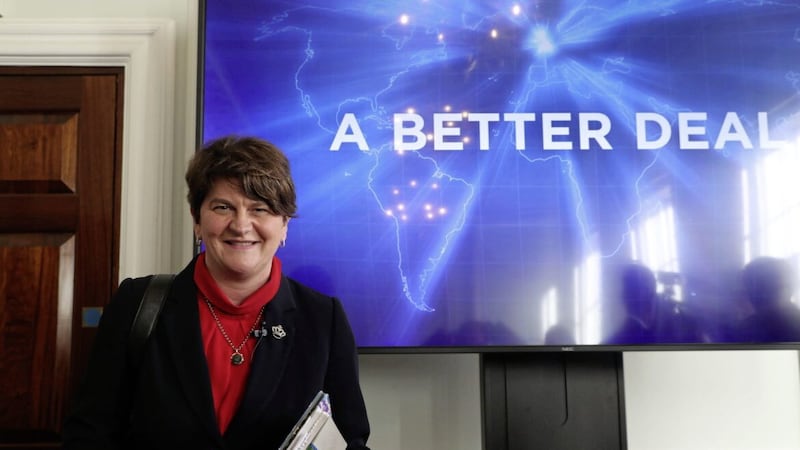Arlene Foster has taken part in a These Times podcast with journalist Tom McTague and Professor Helen Thompson. Naturally it's a self-serving performance about her time crowing on top of the DUP dunghill, but what's also very revealing, if not surprising, is her Ladybird book level of knowledge and understanding of the EU and Brexit.
For example, she still can't understand why the EU couldn't allow a hard British border in Ireland. She believes it was the Republic "pushing the whole issue and couldn't believe their luck" when the UK signed up to it.
She says she didn't know what was going on because Theresa May (wisely) excluded the DUP from negotiations and only found out in December 2017 from "European contacts". Really?
In fact the EU deliberately published its intentions as fully as possible partly to keep its 27 remaining members onside. In December 2016 the European Council published its decision to allow no bilateral negotiations with the British and also gave the Irish government in writing a guarantee that in the event of Irish unity the new Irish state would automatically join the EU without preliminaries.
By early 2017 the EU Council had given Michel Barnier his negotiating guidelines which emphasised the need for, "flexible and imaginative solutions for the unique circumstances on the island of Ireland... avoiding a hard border".
That was all known before Theresa May triggered the countdown for leave negotiations on March 29 2017. Foster was behind the door until December.
Foster also accuses May of caving in to the EU's negotiating position. She said the Protocol, and the "cause of all the problems today is May's negotiation stance. That's where we are, because of what she agreed at that time back in 2017, is the reason we're here today."
That assertion is complete nonsense. In fact May refused to accept an arrangement which would keep the north in 'full alignment' with EU rules. She told the House of Commons, "no UK prime minister could ever agree this". She and her lead negotiator, Olly Robbins, began to thrash around for another solution which would not separate the north of Ireland from the UK market. Their conclusion was to expand the backstop to include the whole UK in a dual regulatory system separating out goods staying in the UK from those going to the EU.
The DUP voted against that, leading ultimately to May's downfall and paving the way for Johnson which, conveniently, Foster seems to have forgotten. Foster also displays an intellectually impoverished notion of EU funding, but perhaps that's because she can't accept that the Republic is now wealthier than the UK.
Incredibly she believes that, "money from the UK was going to the EU, back into the Republic to have all of those nice roads". Duh. Maybe she also believes the £350 million lie on Johnson's campaign bus? Does she not know Germany, the Netherlands, France and others contribute to the EU budget and that the UK refused to pay its share, infamously demanding a rebate?
Furthermore it was not Tom McTague's opinion that the Republic is wealthier than the UK, but the Financial Times statistics which show that next year Slovenia will have a higher standard of living than the UK.
Besides, it's not just a matter of 'nice roads' in the Republic that Foster can't thole. It's the fact that she couldn't admit the wealth is produced by some of the most successful pharmaceutical and computer hardware manufacturers in Europe. She told McTague he obviously visited different parts of the south from her.
The unfortunate truth is that her Ladybird view of the world is accepted by DUP supporters as gospel. The economic advantage of Irish unification is a slam-dunk: higher salary, longer life expectancy, better education, higher pensions and benefits and EU membership benefits.
On the other hand, the DUP insists on impoverishing people here. For what?








